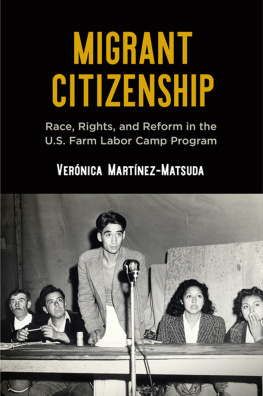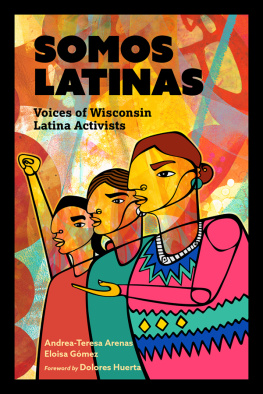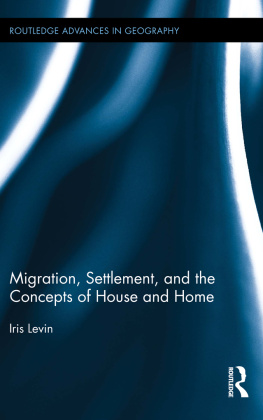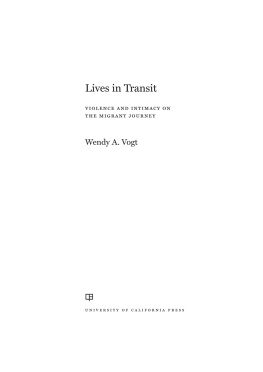Captivity Beyond Prisons
Criminalization Experiences of Latina (Im)migrants
MARTHA D. ESCOBAR

University of Texas Press
Austin
Copyright 2016 by the University of Texas Press
All rights reserved
First edition, 2016
Requests for permission to reproduce material from this work should be sent to:
Permissions
University of Texas Press
P.O. Box 7819
Austin, TX 78713-7819
http://utpress.utexas.edu/index.php/rp-form
Library of Congress Cataloging-in-Publication Data
Escobar, Martha D., author.
Captivity beyond prisons : criminalization experiences of Latina (im)migrants / Martha D. Escobar. First edition.
pages cm
Includes bibliographical references and index.
ISBN 978-1-4773-0816-5 (cloth : alk. paper) ISBN 978-1-4773-0901-8 (pbk. : alk. paper) ISBN 978-1-4773-0829-5 (library e-book) ISBN 978-1-4773-0830-1 (non-library e-book)
1. Women immigrantsUnited StatesSocial conditions. 2. Hispanic American womenUnited StatesSocial conditions. 3. Women illegal aliensUnited StatesSocial conditions. 4. Emigration and immigrationSocial aspects. 5. Emigration and immigrationWomenUnited States. 6. ImmigrantsGovernment policyUnited States. 7. Emigration and immigration lawUnited States. I. Title.
JV6347.E73 2016
365'.4308968073dc23
2015035742
doi:10.7560/308165
Para Sandra, donde quiera que te encuentres...
For Sandra, wherever you may find yourself...
Contents
Acknowledgments
It is difficult to acknowledge everyone who provided me support, especially when it takes an entire community to sustain us through such endeavors. Some will be mentioned by name and others will remain anonymous, but I am eternally grateful to everyone who, in one way or another, made this work possible.
Editors Theresa May and Kerry Webb were very supportive and made what seemed an insurmountable undertaking viable. I also appreciate the insightful feedback and comments of the reviewers who engaged this project in meaningful ways.
Institutional support was fundamental. The Center for US-Mexican Studies at the University of California, San Diego provided me with the time, space, and intellectual inspiration to conduct research. My current academic home, California State University, Northridge, was also instrumental. In addition to support from the Chicana/o Studies Department, the College of Humanities Research Fellowship provided me with invaluable time to dedicate myself to this work.
I am indebted to Justice Now, Critical Resistance, California Coalition for Women Prisoners, Instituto Madre Assunta, and A New Way of Life for opening their doors to me and for their work against gendered and racialized violence.
I am also grateful to the many people at the University of California, Riverside, who continue to offer me their friendship and support. The list is too long to mention everyone by name, but I want to especially thank Alfredo Figueroa, Veronica Ortega, and Estella Acua. They continue to inspire me every day and serve as reminders of why we do what we do.
This book would not have been possible without the mentorship of several amazing scholars to whom I will always be indebted. Lisa Sun-Hee Park unreservedly supported me, challenged me to be a better scholar, and modeled what a good mentor should be. I know I would not be where I am without her guidance. Natalia Molina also offered critical insight for this project and has been vital to my academic development. David Pellow was always encouraging and directed my thinking in new and complicated ways. A remarkable educator, he significantly influenced my pedagogy. David Gutierrezs openness to pushing the boundaries provided a fresh outlook and motivated me to take some risks in my own work. There is no way to overstate the impact that Dylan Rodrguez has had on my academic and personal life. He saw many of us through difficult times and has supported me in so many ways since my undergraduate years. His influence is apparent throughout this work. Finally, Setsu Shigematsus commitment to social justice and her conversations with me on the need to ground ourselves in feminist praxis greatly inspired my research.
This has been a difficult journey, and I know that it would have been even harder without many of the amazing people who struggled with and supported me. I am eternally grateful to Xamuel Baales, Long Bui, Gabriela Cazares, Myrna Garca, Rebecca J. Kinney, Angela Kong, Stevie Ruiz, and Angelica Yaez, great friends and colleagues whose words and solidarity have helped sustain me over the years. I thank Myrna Garca, Rebecca J. Kinney, and Stevie Ruiz for providing important feedback on parts of this project. Jodie Lawstons work, insight, and friendship also made her a valued companion in this journey.
I feel fortunate to be able to call CSU Northridge home. David Rodriguez, former chair of the Chicana/o Studies Department, helped guide me from the very beginning. Mary Pardo has been incredibly supportive and offered important feedback for this project. I would like to express my gratitude to everyone in the department, not only for the warm welcome, but also for their commitment to creating a more livable world. The list of people and their individual contributions is too long to enumerate, but I do want to recognize a few in particular. I am grateful to Francisco Tamayo and Alicia Ivonne Estrada for motivating me to continue writing even in moments when I thought I could not and for always being my companions in this struggle. Marta Lpez-Garza provided such important spaces for me to build community and carry out some of my work. Ana Snchez-Muoz and Yarma Velzquez-Vargas provided important advice when I needed it and constantly make me smile. Through their energy, words, and dedication, Rudy Acua, Christina Ayala-Alcantar, Jorge Garca, Ramon Garca, Gabriel Gutirrez, Rosa RiVera-Furumoto, and Juana Mora have made my time at CSUN invaluable. Also, I appreciate Cynthia Martinez, Jos Rosas, and Rosa Salamanca, students who not only assisted me with this project, but also kept me grounded by sharing their experiences and dedicating themselves to creating change.
This work illustrates the importance of working through boundaries. The following acknowledgments need to be written across languages.
Le doy las ms sinceras gracias a mi familia, quienes me apoyaron a travs de este largo camino. Me dieron consejos cuando los necesit, me ayudaron a entender el mundo un poco mejor, y supieron comprender cuando no pude estar con ellas/ellos. Gabriela, mi hermana, sus palabras y cuidados han sido un recordatorio de la importancia de echarle ganas. Alberto, mi pareja, le agradezco ser la persona que es y siempre ser atento, tanto conmigo como con todas las personas a su alrededor. Ahora compartimos a nuestro hijo Omar, quien nos inspira aun ms a tratar de vivir una vida ms justa. Finalmente, quiero agradecerles a las mujeres y compaeras que compartieron sus historias, sus vidas, sus pensamientos, y sus energas conmigo. Fue un privilegio ser parte de sus vidas, por mucho o por poco tiempo. Estar siempre en deuda con ustedes. Gracias!
Abbreviations
| AEDPA | Antiterrorism and Effective Death Penalty Act (1996) |
| ASFA | Adoption and Safe Families Act (1997) |
| AdSeg | administrative segregation |
| ANWOL | A New Way of Life |
| BNDD | Bureau of Narcotics and Dangerous Drugs |
| Casa | Casa del Migrante |
| CCWF | Central California Womens Facility |
| CCWP | California Coalition for Women Prisoners |







